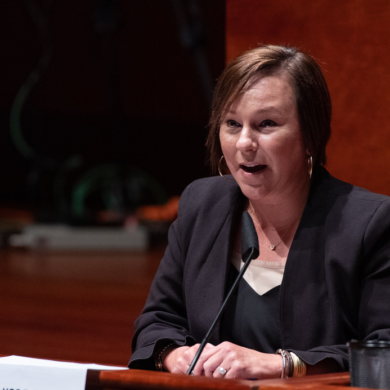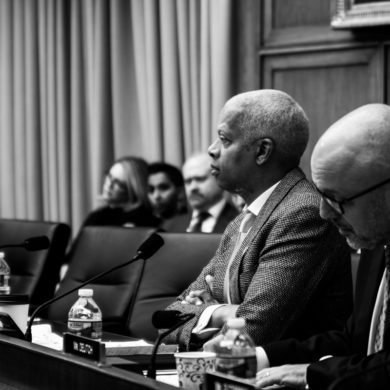Published Date: 12-11-20
By Ruth Vitale
Representative Ted Deutch, of Florida’s 22nd district, is a senior member of the House Judiciary Committee.
RUTH VITALE: Ted, thank you so much for agreeing to this interview. You were one of the first Members of Congress I ever met after taking this job at CreativeFuture. And you remain one of my favorites. Why don’t you tell us what made you get into politics?
REPRESENTATIVE TED DEUTCH: Thanks, Ruth! I’m the youngest of five kids, with parents who were significantly older than most when they had me (pleasant surprise, my mom always said). I was the only child still at home from six on, and I had this ongoing conversation with my dad – a Battle of the Bulge veteran, Purple Heart recipient, and small business owner, and my mom, his war-time bride and bookkeeper for their business – about what was wrong in our country and the importance of service. Politics was a way for me to serve and to try to help a lot of people who deserved the same opportunities that I had and deserved a government that would help knock down the barriers that stood in their way.
RV: As you know, I spent the first 30 years of my career making and distributing indie movies. I care deeply about my community’s ability to be fairly compensated. The rampant digital theft of their work online continues to be a serious problem and an impediment to their being compensated at all for their work. That’s why I’m here. But maybe tell us a bit about why you’re here talking about copyright. Why do you care?
TD: Music and the arts are a huge part of who I am. I was in plays in school, I learned a few instruments, and I still love playing piano and keyboards today. I’m not really too talented, but I have immense respect for people who are, and everyone who helps them produce music and the other content that we love and have all relied upon during the pandemic. Copyright can sound pretty dry and a little boring if you listen to some of our hearings, but the issues at stake are some of the most important ones that we can address.
What we are really talking about is how we sustain the industry that lifts us up, how we reward the musicians whose songs make a terrible day bearable, and how we ensure that the next generation of artists are able to continue to inspire, unite, and challenge us. It would be great if new music and movies and shows magically appeared on our phones, but it’s not magic. Many things have to go right on the business side of creativity. Protecting copyright is a big part of ensuring a healthy and balanced creative ecosystem.
RV: What do you think is the one thing most Americans, or most of your constituents, don’t know about copyright and the policy fights that occur in DC?
TD: What I think gets lost and what I so appreciate about the work you have been doing, Ruth, is how vital our copyright system is to our overall economy. When we talk about protecting copyright, it is not just protection for a few star actors and directors or chart-topping singers and bands. There are so many jobs – middle class jobs all across this country – that are key parts of the creative community. It is easy to picture the big-name Oscar® and Grammy® winners. But as you know so well, there are thousands of people whose names most of us never know behind the music and movies we all enjoy.
RV: As you know, the Senate IP Subcommittee began 2020 by announcing a year-long series of hearings to assess the Digital Millennium Copyright Act (DMCA), 22 years after its passage. Why is it important to review this law? What parts of the law do you think most need updating?
TD: I was not in Congress when the DMCA was passed, and I appreciate that it was a delicate balance of many important concerns that was the best they could do at the time. But that was a lifetime ago in technology – two decades and countless technological innovations ago. We can safeguard the copyright protections of creators while also encouraging companies to continue to innovate. And the focus must span copyright holders large and small, and both technology companies and innovative entrepreneurs with technology to challenge them. Lately, we have been talking about the problem with our current notice and takedown regime and the difficulty prosecuting criminal enterprises that use large-scale piracy as a source of free and illegal money.
RV: Many have identified the safe harbor immunities given to Big Tech, by both the DMCA’s Section 512 and Section 230 of the Communications Decency Act, as a core problem with today’s laws governing the internet. Can you give us any insight into how you believe the problem with these immunities can be solved?
Well, copyright violations should never be protected by federal law. We can start by acknowledging that the integrity of the free and open internet is not threatened by robust copyright enforcement. We really can have both here, and I do think that we have bipartisan and bicameral recognition that it is time to get to work on what that should look like. This debate has played out in Europe, where reforms aimed at balancing their own system have not led to the doomsday scenarios that some opponents of reform had predicted.
RV: Often times, Silicon Valley and Hollywood are on opposite sides of the policy debates around copyright. Do you see areas of compromise where you would encourage the two sides to cooperate and work toward solutions outside of legislation?
TD: While there has been longstanding antagonism, there are also many shared interests. And the dramatic changes in the way we consume content have blurred the lines between traditional ideas of tech companies versus content companies. I have been encouraged by the work that these communities have done to find common ground on felony streaming. As you know, as more and more legitimate content has shifted to streaming, copyright violations and piracy have, too.
Our current laws were written long before this technology and our modern internet capacity were even contemplated. As a result, we have what amounts to a streaming loophole in our laws against piracy, where the penalties for streaming content illegally are far below other equivalent forms of piracy. I do think that we ultimately need legislation to solve this problem, but the groundwork for that solution was laid through hard work and compromise from the entertainment and tech worlds.
RV: Our country is having an important conversation about systemic racism right now. Have you recently seen a movie or read a book that you found enlightening?
TD: We had a crucially important conversation about systemic racism during the summer. It was honest and genuine, and everyone was involved in it. We must continue the conversation, and we must act on it. I’m looking forward to working with the Biden Administration to enact meaningful change. I recently re-watched Ava DuVernay’s film 13TH that so powerfully traces the history of systemic racism in our country and makes clear what needs to be done to address these ongoing injustices and stop the dehumanization of our fellow citizens.
RV: Tell us what you’ve been watching during this time when so most of us are spending more time at home.
TD: I just watched The Trial of the Chicago 7 and thought it was fantastic. My family and I watched the Lord of the Rings trilogy and the Raiders of the Lost Ark trilogy. I watched a very wide range of content from Tiger King to The Plot Against America to the new Borat (Borat Subsequent Moviefilm) and The Crown. And we really loved Schitt’s Creek and Ted Lasso! Movies, television, and music have been so helpful as we try to get a break from the challenges we are all facing, just for a little while.
RV: As we begin the very slow process of reopening the economy, how do you think we can help all of the people in our communities who don’t see their job coming back anytime soon? I’m thinking about live music venues, musicians on tour, theater stagehands, etc. etc.
TD: Yes. I can’t wait for live music – any of it and all of it. Unfortunately, it’s still hard to see us getting back to normal really soon. While I know that some lost income can be supplemented with innovation and increased content direct to homes, there are many, many jobs where that is just not possible. Of course, illegal streams and other piracy endanger whatever progress a shift in technology could bring as well.
I worked hard in the first coronavirus relief package to ensure that independent contractors and gig workers, including songwriters and musicians, would be able to qualify for assistance, and I have continued to work through the obstacles many states have put in place to make it harder for individuals to qualify for unemployment assistance. We need to provide targeted relief to small and medium sized venues so that they can keep afloat even as their doors are closed to prevent further spread of this virus. And we need to ensure that the assistance and loan programs anticipate the real needs of the creative community and can adapt to the variety of ways that people make a living in these industries.



